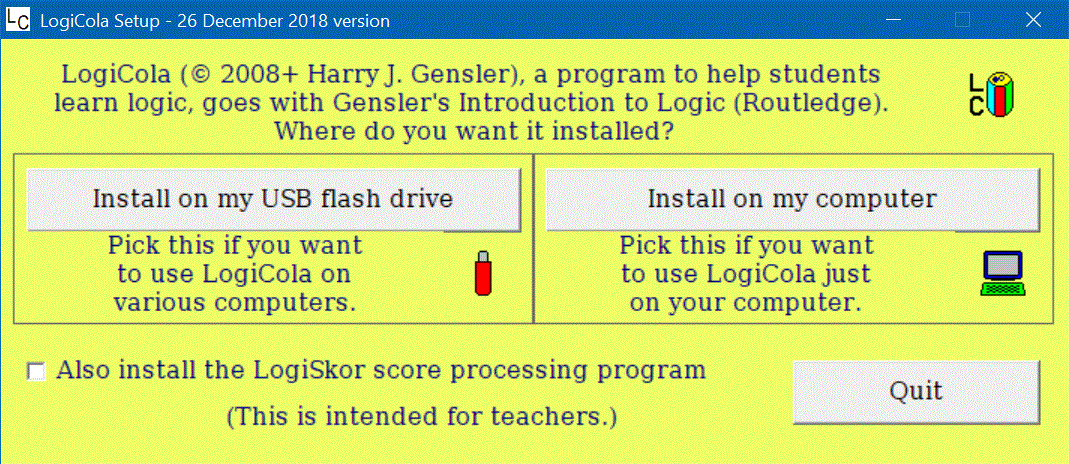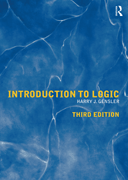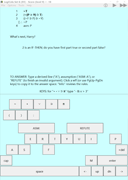This very comprehensive
Introduction to Logic covers:
- syllogisms;
- informal aspects of reasoning (like meaning and fallacies);
- inductive reasoning;
- propositional and quantificational logic;
- modal, deontic, and belief logic;
- the formalization of an ethical view about the golden rule; and
- metalogic, history of logic, deviant logic, and philosophy of logic.
Different parts can be used in a range of logic courses, from basic introductions to graduate courses. The teachers manual and the end of Chapter 1 both talk about which chapters fit which type of course.
Earlier Routledge editions appeared in 2002 and 2011. Features included (a) clear, concise writing; (b) engaging arguments from philosophy and everyday life; (c) simpler ways to test arguments, including an innovative proof method and the syllogism star-test; (d) the widest range of materials of any logic text; (e) high suitability for self-study and preparation for tests like the LSAT; (f) a reasonable price (a third that of some competitors); and (g) the free companion LogiCola instructional program (which randomly generates problems, gives feedback on answers, provides help and explanations, and records progress). I'm happy with how earlier editions were received, often with lavish praise.
I improved this third edition in many ways. I went through the book, making explanations clearer and more concise. I especially worked on areas that students find difficult, such as (to give a few examples) why "all A is B" and "some A is not B" are contradictories (§2.4), deriving syllogistic conclusions (§2.5), the transition from inference rules to formal proofs (§§6.10-13 & 7.1), how to evaluate formulas in quantificational logic (§§8.3 & 8.5), how to translate "exactly one" and "exactly two" in identity logic (§9.1), multiple-quantifier translations and endless-loop refutations in relational logic (§§9.4-9.5), when to drop a necessary formula into the actual world in modal logic (§10.2), and how inference rules work in belief logic (§13.2). I expanded sections on traditional Copi proofs (§§7.5, 8.6, and 9.7, urged on by reviewers) and truth trees (§7.6, urged on by my friend Séamus Murphy), for teachers who might also want to teach these methods or have students learn them on their own for additional credit (as I do). "For Further Reading" now mentions further sections of the book that an advanced student might want to pursue while doing specific chapters; for example, the Basic Propositional Logic chapter goes well with sections on metalogic, deviant logic, and philosophy of logic. I didn't substantially change exercise sections. Despite additions, the book is now six pages shorter.
The book now has a very nice Kindle e-book version, with real page numbers, based on a second version of the manuscript that I made with simplified formatting. And yes, you can add your own highlighting and notes.
I improved the companion LogiCola software, which runs on Windows, Macintosh, and Linux. Cloud Sync allows syncing scores between various computers. Proofs have a Training Wheels option; this gives hints about what to derive (it might bold lines 4 and 7 and ask "4 is an IF-THEN; do you have the first part true or the second part false?") - hints disappear as your score builds up. Touch features let LogiCola be done using only touch, only mouse and keyboard, or any combination of these; touch works nicely on Windows tablets or touch-screen monitors. Quantificational translations have a Hints option; this gives Loglish hints about how to translate English sentences (for "All Italians are lovers" it might say "For all x, if x is Italian then x is a lover") - hints disappear as your score builds up. There are exercises for Copi proofs and truth trees; to process scores from these, your LogiSkor program needs a version date of at least January 2016. And the Macintosh setup is easier. LogiCola (with a score-processing program, teachers manual, class slides, flash cards, and sample quizzes) can be downloaded for free from http://www.harryhiker.com/lc or http://www.harrycola.com/lc. All supplementary materials are conveniently accessible from LogiCola's HELP menu; so I suggest that you just install LogiCola (teachers should check the option to install the score processor too).
I wish to thank all who have somehow contributed to this third edition. I thank Andy Beck at Routledge and his staff and reviewers, who made good suggestions. I thank my logic students, especially those whose puzzled looks pushed me to make things clearer. And I thank the many teachers, students, and self-learners who e mailed me, often saying things like "I love the book and software, but there's one thing I have trouble with ...." If this third edition is a genuine improvement, then there are many people to thank besides me.
Long live logic!
Harry J. Gensler
Philosophy Department
Loyola University
Chicago, IL 60660 USA
Some quotes from reviewers
"Equal parts eloquent and instructive, Gensler has once again provided an invaluable resource for those looking to master the fundamental principles of logic. The Third Edition improves upon an already exceptional text by infusing the introduction of new concepts with enhanced clarity, rendering even the most challenging material a joy to teach. The updated LogicCola program is sure to become an indispensable component of my own introductory course."
Christopher Haley, Waynesburg University, USA
"This Third Edition improves on a book that was already superb. I have used Gensler's book to teach introductory courses in logic to undergraduate philosophers and linguists, and the response from the students has always been positive. They appreciate its clear explanation and the wealth of examples and practice opportunities it provides. In particular, the translation exercises help to refine
logico-semantic intuitions. The supporting LogiCola software, which is feely downloadable, is a great support tool."
Mark Jary, University of Roehampton, UK
"The Third Edition is an improved version of an already excellent introduction to logic. Gensler's Reductio proof procedure enables a seamless transition from elementary propositional logic to quantification theory and more advanced modal logics. Many of the exercises involve formulations of philosophical problems. The explanations of advanced topics have been greatly improved. The upgraded LogiCola program now supports alternative proof procedures. This book is a winner!"
Michael Bradie, Bowling Green State University, USA
![]() Download LogiCola
Download LogiCola
![]()


